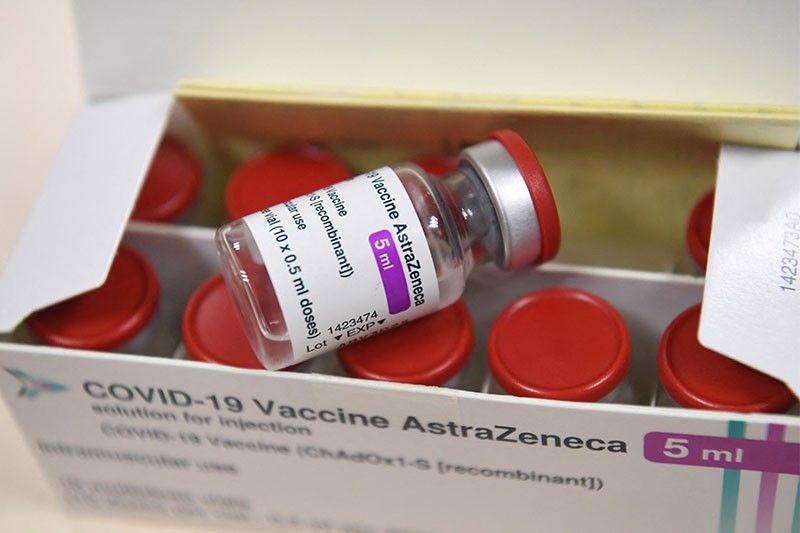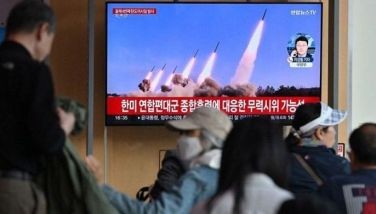WHO gives global green light for AstraZeneca COVID-19 shot

GENEVA, Switzerland — The World Health Organization gave emergency use approval to AstraZeneca's COVID-19 vaccines on Monday, meaning distribution can start to poorer countries starved of doses to fight the pandemic.
The AstraZeneca-Oxford jab forms the bulk of batches being lined up through Covax, the global programme aimed at procuring and shipping out vaccines equitably around the world, regardless of wealth.
It is only the second COVID-19 jab to have received WHO authorisation, after the Pfizer-BioNTech vaccine.
"The WHO today listed two versions of the AstraZeneca-Oxford COVID-19 vaccine for emergency use, giving the green light for these vaccines to be rolled out globally through Covax," the UN health agency said in a statement.
The two versions given the seal of approval are being produced by the Serum Institute of India (SII), and by SKBio in South Korea.
Separate reviews were needed for each production process, although the vaccine is the same.
"Countries with no access to vaccines to date will finally be able to start vaccinating their health workers and populations at risk, contributing to the Covax facility's goal of equitable vaccine distribution," said WHO assistant director general Mariangela Simao.
"But we must keep up the pressure to meet the needs of priority populations everywhere and facilitate global access. To do that, we need two things — a scale-up of manufacturing capacity, and developers' early submission of their vaccines for WHO review."
337.2 million doses
The organisation's emergency use listing procedure assesses the quality, safety and efficacy of COVID-19 vaccines, and is a prerequisite for vaccines in the WHO co-led Covax facility.
AstraZeneca vaccines from India and South Korea made up almost all of the initial 337.2 million doses lined up for Covax's first wave of distribution, which is set to get moving in late February.
Some 145 participating economies are set to receive enough doses to immunise 3.3 percent of their collective population by mid-2021.
The first wave includes 240 million SII AstraZeneca doses; 96 million South Korean AstraZeneca doses; and 1.2 million Pfizer doses.
Both vaccines require two injected doses.
"We now have all the pieces in place for the rapid distribution of vaccines," WHO director-general Tedros Adhanom Ghebreyesus told a press conference.
Simao added: "There's no need to panic and no need for countries to go buying in the market, because they're going to pay more."
OK for over-65s
Last week in a separate process, the WHO's Strategic Advisory Group of Experts on Immunization issued its interim usage recommendations for the AstraZeneca vaccine.
Soothing fears about the jab, SAGE concluded it could be used for people aged over 65, and also where coronavirus variants of concern are circulating.
SAGE acknowledged the lack of data on the vaccine's efficacy for over-65s, which has prompted a number of countries to withhold it from by far the most vulnerable age group.
But the experts decided that given its performance with younger adults, "it is likely that the vaccine will be found to be efficacious in older persons. The trial data indicate that the vaccine is safe for this age group."
They said the vaccine proved more effective when the interval between doses was extended to between eight and 12 weeks.
The number of reported COVID-19 cases globally has dropped for a fifth consecutive week, nearly halving from more than five million in the week of January 4, to 2.6 million in the week starting February 8.
"The fire is not out, but we have reduced its size. If we stop fighting it on any front, it will come roaring back," Tedros warned.
Pharma giants Sanofi and GSK said on July 29, 2020, that they have agreed to supply Britain with up to 60 million doses of a potential COVID-19 vaccine. The agreement covers a vaccine candidate developed by France's Sanofi in partnership with the UK's GSK and is subject to a "final contract."
This thread collects some of the major developments in the search for a vaccine to ease the new coronavirus pandemic. (Main photo by AFP/Joel Saget)
As negotiations towards a new pandemic treaty pick up pace, observers warn of watered-down efforts to ensure equitable access to the medical products needed to battle future Covid-like threats.
Shaken by the pandemic, the World Health Organization's 194 member states are negotiating an international accord aimed at ensuring countries are better equipped to deal with the next catastrophe, or even prevent it altogether.
The process is still in the early stages, with the aim of reaching an agreement by May 2024.
But critics warn that revisions being made to the preliminary negotiating text are weakening the language -- notably in a key area aimed at preventing the rampant inequity seen in access to vaccines and other medical products during the Covid pandemic.
"I think it is a real step backwards," Suerie Moon, co-director of the Global Health Centre at the Geneva Graduate Institute, told AFP. — AFP
Africa's first mRNA vaccine hub is ceremonially launched on Thursday to acclaim from the UN's global health chief, who hailed it as a historic shift to help poor countries gain access to life-saving jabs.
The facility was set up in the South African city of Cape Town in 2021 on the back of the success of revolutionary anti-Covid vaccines introduced by Pfizer/BioNTech and Moderna.
"This precious project... will bring a paradigm shift in addressing the serious problem we faced, the equity problem, during the pandemic, so (that) it's not repeated again," World Health Organization (WHO) head Tedros Adhanom Ghebreyesus tells a media briefing to mark the inauguration. — AFP
China has approved its first locally developed messenger RNA (mRNA) vaccine against Covid-19, its manufacturer said Wednesday, months after the relaxation of strict Covid-zero regulations sparked a surge in cases.
The vaccine, developed by CSPC Pharmaceutical Group Ltd, has been approved for "emergency use" by Beijing's health regulator, the company said in a statement.
It showed high efficacy in a trial in which it was used as a booster shot for people who have been given other types of vaccines, the company added, without offering further details. — AFP
COVID-19 vaccine maker Novavax raises doubts about its ability to continue its business, announcing plans to cut spending after struggles in rolling out its coronavirus jab.
Shares of Novavax plummeted 25 percent in extended trading, after the company reported fourth-quarter earnings that missed analyst estimates.
While the firm should have enough money to fund operations, the situation is "subject to significant uncertainty," it says in a statement. — AFP
The protection against Covid-19 from being previously infected lasts at least as long as that offered by vaccination, one of the largest studies conducted on the subject says.
Ten months after getting Covid, people still had an 88% lower risk of reinfection, hospitalisation and death, according to the study published in the Lancet journal.
That makes this natural immunity "at least as durable, if not more so" than two doses of Pfizer or Moderna's vaccines, the study says.
The authors nevertheless emphasized that their findings should not discourage vaccination, which remains the safest way to get immunity. — AFP
- Latest
- Trending































